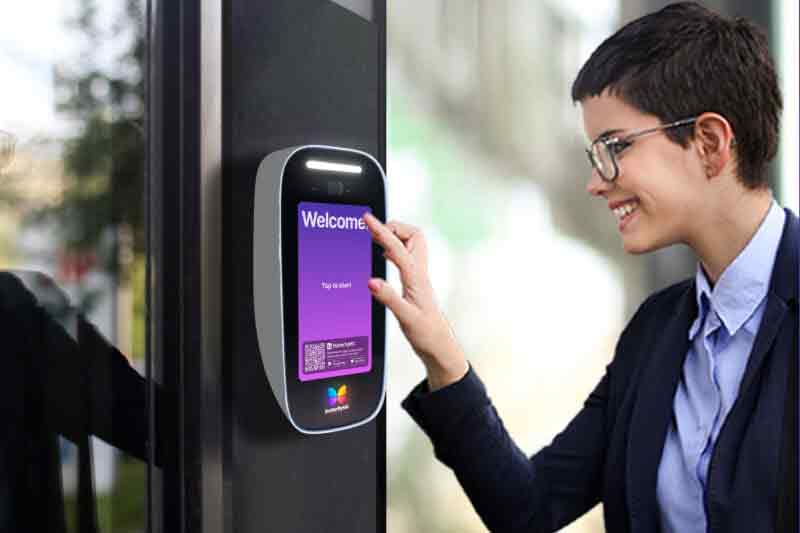Key takeaways
- Robust real estate marketing is essential to running a successful property, whether it’s an apartment building, gated community, commercial office space, or industrial complex.
- To ensure profitable real estate marketing, you must establish a plan with clear goals, audience, and budget considerations.
- Some ways to boost your real estate marketing efforts include recording apartment tours, managing online reviews, investing in proptech, and studying the competition. For more tips, continue reading.

Having a durable, original, and distinctive real estate marketing strategy is key to generating leads and attracting prospects. But how can you think outside the box while still being effective? In today’s digital age, it’s critical you use marketing to get your real estate investment in front of the right prospects.
In this post, we define what real estate marketing is in the digital age. Then, we teach you how to create a robust real estate marketing plan. Finally, we give you 15 creative, bulletproof strategies to make your real estate marketing efforts stand out.
This post covers:
- What is real estate marketing?
- How do you target a real estate market?
- 15 creative real estate marketing ideas to stand out
What is real estate marketing?
Real estate marketing is the practice of advertising your property — typically to find new residents or tenants. However, much of the work that goes into property marketing includes retaining current tenants.
Originally, real estate marketing ideas were limited to print advertisements, including in newspapers, magazines, and the yellow pages. But in the last 20 years, advertisers have seen a sharp decline in traditional media. As a result, marketing has made the jump from print to digital.
And marketing for real estate is no exception.
How do you get leads in real estate?
The best real estate marketing strategy for getting leads is digital marketing. Instead of advertising multifamily buildings, commercial offices, and industrial facilities in relevant print magazines, you now must use the internet to attract renters.
Overall, the goal of real estate marketing is to attract new apartment renters or commercial tenants through unique social media marketing strategies.
Many real estate professionals opt to hire real estate marketing companies. However, it’s possible to create an effective marketing strategy without the help of a real estate marketing agency. Read on to discover how.
How do you target a real estate market?
So, you know you need to market your real estate strategically and carefully, but where do you start? A great first step is to create a marketing plan.
Whether you’re trying to appeal to recent post-grad renters or seniors who’ve spent decades navigating the real estate market, you need to create a real estate marketing plan.
Your marketing plan will be the primary manufacturer of real estate leads, so it’s paramount that you put plenty of thought into yours. Your real estate marketing plan should include clear goals, milestones, and flexibility in case of inevitable roadblocks.

15 creative real estate marketing ideas to stand out
Unless you already have a large audience of potential renters at your disposal, real estate marketing takes time. But you can reduce the time it takes for your marketing to pay off by employing unique real estate marketing ideas.
In fact, if you opt for modern yet unique property marketing ideas, you’ll find yourself with an impressive list of leads that convert to satisfied tenants.
Here are 15 real estate marketing tips:
- Design an engaging website
- Create 3D virtual tours
- Record video walk-throughs
- Optimize your marketing with SEO
- Boost your social media presence
- Invest in proptech
- Improve your property’s curb appeal
- Write email marketing campaigns
- Build a referral program
- Manage online reviews
- Identify your target audience
- Study your competition
- Clarify your goals and message
- Establish your budget
- Choose your media distribution
1. Design an engaging website
While the standard of having a website for your property isn’t new, there’s a big difference between a typical website and a professional one.
If you can, hire a real estate marketing agency to build a polished site. However, with just a bit of research, you or your property manager can build a website that visitors can easily navigate.
Here are the best ways to market your real estate business when building a property website:
- Keep the aesthetics of your site uniform.
- Ensure the site is easy to navigate — and pages load quickly.
- Update your rental listings regularly with new vacancies and listings.
- Maintain a high-quality look and feel with sharp photos, quality content, and few or no pop-ups.
- List your contact information clearly.
- Link to your property website on various rental listing websites.
2. Create 3D virtual tours
Virtual tours empower prospects to “visit” your property from anywhere. This will not only increase convenience, but it’s a viable option to increase accessibility at your property.
Virtual tours are different from simple photographs of your property. They require special software and a 360-degree camera to capture 3D renderings of spaces. Prospects can navigate the tour by clicking through the virtual tour. As a result, they’ll feel like they’re actually in the building without having to visit in person.
Pro tip: Once prospects view virtual tours online, they may want to visit your property in person. So, allow them to visit the building on their own time by offering self-guided tours. This way, they can tour soon after viewing your property online, keeping it top-of-mind and increasing conversions.
Check out your complete guide to virtual staging software:
3. Record video walk-throughs
If you want to revamp your real estate marketing and engage prospective renters, consider creating video walk-throughs of your property.
These are a great alternative to virtual tours because they can be completed with just a camera. So, you’ll save a significant amount of money in comparison to 3D virtual tours.
To record video walk-throughs, use a high-quality camera — most smartphone cameras will work for this. Record a tour for each unique floor plan, common areas, and amenity spaces.
Additionally, stage vacant units before recording a tour. If a prospect can imagine themselves living or working in your space, they’ll be more likely to book a tour or submit an application.
Finally, upload them to your property website and clearly label them to use as real estate content for social media.
4. Optimize your marketing with SEO
SEO, or search engine optimization, is the practice of improving the quality of website content to drive traffic to your site. Any analysis of the real estate market will reveal that search engine optimization is key to optimizing your marketing strategy.
Nowadays, most renters begin their property search online. So, you should appeal to the algorithms of search engines with SEO efforts. Furthermore, SEO specifically targets unpaid traffic rather than paid traffic from online ads.
So, using SEO is a way to drive prospective renters to your website without spending extra money on advertising.
Additionally, appropriate SEO will ensure that the users visiting your website are optimal prospects. For example, if your property is a commercial building, SEO will make sure that the people visiting your site are looking to rent office space.

5. Boost your social media presence
Real estate marketing on social media is key to any plan. Gaining followers — and getting them to engage with your content — is a proven way to increase interest in your property.
Here are some social media marketing ideas for real estate:
- Use Instagram stories. Promote your latest social posts to direct users to your profile. You can even link directly to new listings from your stories.
- Utilize Twitter (X) hashtags. Similar to SEO, Twitter hashtags are a great way to appear in relevant searches for free. But don’t overload each tweet with hashtags. Instead, stick to one or two per post.
- Reach out to influencers. Influencers don’t just pertain to fashion and pop culture. There are plenty of real estate professionals who’ve established themselves as influencers with legitimate followings. Consider partnering with them to promote your listings. Conversely, study how they appeal to users and emulate that style in your own social media content.
6. Invest in proptech
Whether you’re renting out a multifamily building, a gated community, a commercial office space, or even an industrial complex, renters seek technology.
Here are the proptech solutions you should consider for each property type:
- Multifamily. Smart video intercom systems help control property access, elevator controls increase security, and an automated package room manages deliveries.
- Gated communities. Gate access control systems allow only residents and authorized visitors to enter. Property management software will keep your residents organized. What’s more, vehicle access control helps facilitate the flow of cars and service trucks through your property securely.
- Commercial offices. Asset utilization software can help you manage tenants at your co-working or commercial space.
- Industrial complexes. Keypads will protect private spaces, and intercoms will monitor the front entrance. Additionally, smart thermostats can attract renters that need temperature-controlled spaces.
Make sure you promote the proptech solutions you’ve implemented at your property. Investing in technology isn’t cheap, so mention them in advertisements, social posts, and other content to maximize your return on investment.
Discover five smart apartment gadgets to attract new tenants:
7. Improve your property’s curb appeal
While online marketing is key to modern real estate marketing, sometimes something as simple as an attractive building is enough to draw in prospects. So, enhancing your property’s curb appeal is essential.
Here are a few simple ways to increase curb appeal at your property:
- Clean windows and remove any trash from the premises.
- Spruce up outdoor community spaces.
- Maintain pavement — this will also make navigating your property easier and more accessible.
- Surround your property with diverse plants.
- Repaint your building on schedule every few years, but also repaint if any paint is chipped, peeling, or generally looks dingy.
Further, not only does curb appeal increase conversions during in-person viewings and tours, but it also helps your property stand out on rental listing websites.
8. Write email marketing campaigns
Email marketing is where the future of traditional marketing lies.
Use an email marketing system to collect email addresses and send relevant, timely updates regarding your property.
Here are some real estate email marketing tips:
- Set up an email sign-up form on your website. The larger your recipient list, the more effective your email marketing will be. Use effective calls-to-action to entice website visitors to opt into your email list.
- Create an automatic response for when you’re not available immediately. Let recipients know that you’re not available right now, but they’ll hear a response as soon as possible.
- Include relevant information in your email signature. For example, list your name, contact information, and open office hours.
- Format emails for all devices. Nothing’s worse than an email that looks great on a desktop but is disjointed and confusing on a smartphone or tablet. Use a template that’ll automatically format emails for different devices.
- Personalize emails with the recipient’s first or last name. There are plenty of programs that’ll do this for you with a simple code.

9. Build a referral program
One of the best ways to find new tenants is word of mouth from your current tenants.
Encourage them to spread the word about your property by creating a rewarding referral program. Offer something in exchange for successful referrals to persuade tenants to start marketing your real estate themselves.
Furthermore, happy tenants will refer friends, family, or professional contacts with similar needs. So they’ll be more likely to find tenants who are a great fit for your property. Additionally, when you reward your tenants, they’ll be more likely to renew leases and become long-term tenants.
Here are a few easy referral rewards:
- Amazon or Visa gift cards.
- Reduced rent.
- Gift certificates for local businesses
10. Manage online reviews
Online reviews have a huge impact on your property’s reputation. So, take control of your reputation by asking for reviews from great current and past tenants.
Make sure your property has consistent, good reviews across all platforms, including Google, Yelp, and Facebook Marketplace. This will prove your property’s consistency and reliability to prospective renters.
Additionally, post good reviews on your website directly. You can even go as far as to highlight the best reviews as large stylized quotes on your website.
11. Identify your target audience
Are you trying to market student housing or a senior living facility? Is your property in an urban, suburban, or rural area? Is your property a commercial office space, gated community, or multifamily building? Are your prospective renters young, new renters, or seasoned residents?
The answers to these questions will guide your marketing plan. What’s more, these answers will help you target your ideal real estate market and acquire more qualified leads.
Moreover, analyzing your customer base and refining your target audience helps you understand who is interested in your property and adjust your messaging accordingly.
12. Study your competition
Studying your competition is a crucial tactic when employing new marketing strategies.
Here are a few reasons why you should always study your competitors:
- Understand your market. Studying competitors helps you gain valuable insights into the real estate market. By analyzing their strategies, you can better understand pricing, property features, and target demographics.
- Identify unique selling points (USPs). Analyzing your competition allows you to identify what makes your properties stand out. This helps you refine your USPs and communicate them effectively to prospects. What’s more, understanding your competition enables you to differentiate your real estate offerings and identify gaps in the market. So, you can tailor your marketing efforts to fill those gaps and cater to unmet needs.
- Gain pricing insights. Monitoring competitor pricing helps you set competitive yet realistic price points for your properties. This ensures your offerings are attractive to prospects while still reflecting the market value.
- Adapt to emerging trends. Stay up-to-date with current real estate trends and adapt your marketing efforts accordingly.
- Innovate your marketing strategy. Analyzing what’s working for your competition can inspire you to innovate and come up with fresh marketing ideas. By observing what works for others, you can brainstorm new ways to present and market your properties.
- Continue to improve. Analyzing your competition helps keep you engaged in a cycle of improvement. By learning from others and incorporating those lessons into your marketing efforts, you can continually improve your real estate business.
13. Clarify your goals and message
Strategy is at the center of any marketing campaign. Figure out what aspects of your property are the most important to highlight.
Further, decide on a cohesive messaging strategy. When your entire plan reflects one signature branded style, it’s more attractive to prospective renters.
14. Establish your budget
Establishing a marketing budget provides a clear framework for allocating funds specifically for marketing efforts.
The last thing you want while marketing your property is to go over budget. So, create a clear budget and stick to it.
Here’s why a marketing budget is vital:
- Allocate resources. A budget helps you allocate resources effectively — especially money, time, and personnel— to different marketing activities. This ensures that each initiative receives the appropriate attention and resources.
- Set goals. A well-defined marketing budget helps you set realistic goals based on the resources available. What’s more, these goals guide your expectations and help measure the success of marketing campaigns.
- Boost ROI. A budget allows you to track the return on investment (ROI) for each marketing campaign. This helps you determine which strategies are yielding the best results and whether adjustments are needed.
- Gain a competitive edge. A well-managed marketing budget allows you to compete effectively with other real estate businesses. So, you can invest in strategies that set you apart and attract more prospects.
15. Choose your media distribution
The media’s overall shift from print to digital has resulted in more digital marketing than ever. So, decide exactly how you want to spread advertisements for your property.
Options include television and radio ads, or consider brainstorming unique social media ideas for real estate content, and email marketing.
The path you take will impact the age of your renters. Digital marketing results in more millennial and Gen Z renters, while traditional ads will attract older, more seasoned renters.







